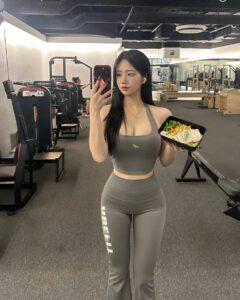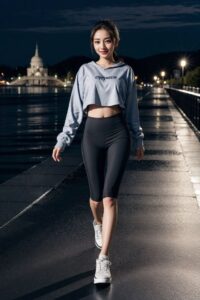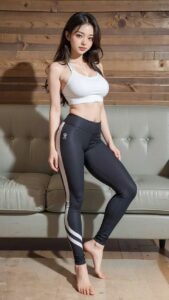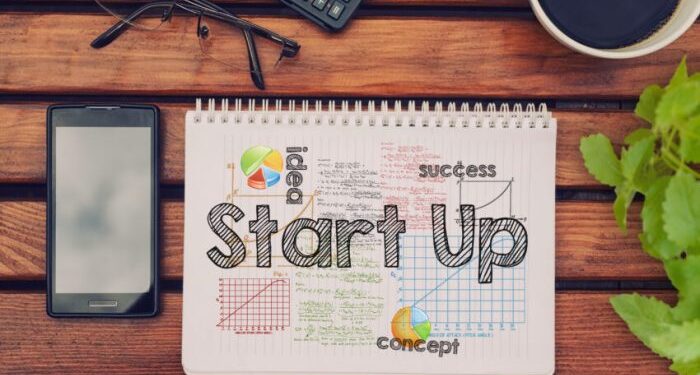
Exploring the fascinating realm of Smart Women, Smart Code: Beauty Made by AI, this discussion dives into the innovative fusion of technology and beauty. Prepare to uncover how AI is reshaping beauty standards and revolutionizing the way beauty products are created and experienced.
Delve into the intricate details of AI's impact on the beauty industry, from ethical considerations to future trends that promise a more personalized beauty experience.
Introduction to Smart Women, Smart Code: Beauty Made by AI
Smart Women, Smart Code is a revolutionary concept that combines the expertise of women in the beauty industry with the power of AI technology to create innovative beauty products tailored to individual needs. This collaboration aims to transform the way we perceive and interact with beauty products, enhancing the overall user experience.AI plays a crucial role in the development of beauty products by analyzing vast amounts of data to identify trends, preferences, and skin conditions.
This technology enables brands to offer personalized solutions that cater to the specific requirements of each customer, leading to more effective and targeted products.The intersection of technology and beauty represents a new era in the beauty industry, where data-driven insights and advanced algorithms are used to develop products that are not only effective but also sustainable and ethical.
By harnessing the power of AI, beauty brands can create products that are truly innovative and cater to the diverse needs of consumers.
Advancements in Beauty Technology
AI technology has been making significant strides in revolutionizing the beauty industry. By utilizing artificial intelligence, beauty companies are able to create innovative products that cater to individual needs and preferences. This shift towards AI-driven beauty solutions has brought about a wave of benefits for both consumers and companies alike.
AI-Driven Beauty Products
- Virtual makeup try-on apps: AI-powered applications allow users to virtually try on different makeup products and shades before making a purchase, eliminating the need to physically test products in-store.
- Personalized skincare solutions: AI algorithms analyze skin conditions and recommend personalized skincare routines and products based on individual needs, leading to more effective results.
- Smart mirrors: These mirrors equipped with AI technology can analyze skin conditions, provide personalized beauty tips, and even suggest makeup looks based on facial features.
Benefits of Using AI in Creating Beauty Products
- Enhanced customization: AI algorithms can analyze vast amounts of data to provide personalized beauty solutions tailored to each individual's unique preferences and characteristics.
- Improved efficiency: AI streamlines the product development process by optimizing formulations, identifying trends, and predicting consumer preferences, leading to faster and more efficient product launches.
- Cost-effective solutions: By utilizing AI technology, beauty companies can reduce costs associated with traditional product development methods, such as extensive testing and market research, ultimately leading to more affordable products for consumers.
Impact of AI on Beauty Standards

AI technology has significantly influenced beauty standards in recent years, shaping the way we perceive and define beauty. With the ability to analyze vast amounts of data and identify patterns, AI has revolutionized the beauty industry, impacting everything from skincare to makeup trends.
AI Influence on Beauty Standards
- AI algorithms can analyze facial features to determine the most 'ideal' proportions based on cultural preferences and historical beauty standards.
- AI-powered beauty apps provide personalized recommendations for skincare routines, makeup looks, and even cosmetic procedures, catering to individual preferences and enhancing beauty standards.
- Virtual try-on tools use AI to simulate different beauty products on a user's face, allowing for a virtual test before making a purchase, influencing consumer choices and trends.
Implications of AI-generated Beauty Standards
- AI-generated beauty standards can perpetuate unrealistic ideals and promote a homogenous concept of beauty, potentially contributing to issues like body image dissatisfaction and low self-esteem.
- There is a concern that reliance on AI for beauty standards may limit diversity and inclusivity, as algorithms may favor certain features or characteristics over others, leading to a lack of representation.
- The democratization of beauty through AI technology can also empower individuals to experiment with different looks and styles, challenging traditional standards and promoting self-expression.
Comparison with Traditional Beauty Standards
- Traditional beauty standards have often been influenced by societal norms, cultural beliefs, and historical perceptions of beauty, whereas AI-generated standards are more data-driven and customizable.
- AI has the potential to redefine beauty standards by focusing on individual preferences and personalized beauty recommendations, moving away from a one-size-fits-all approach seen in traditional standards.
- While traditional beauty standards may be based on subjective opinions and trends, AI-generated standards rely on objective data and analysis, offering a new perspective on beauty evaluation.
Ethical Considerations in AI Beauty Products
Ethical considerations in the development and use of AI in beauty products are crucial to address in order to ensure the well-being and privacy of consumers. As AI technology continues to advance, it is important to examine the ethical implications that come with it.
Data Privacy and Security Concerns
Data privacy and security are major concerns when it comes to AI beauty products. The collection of personal data, such as facial recognition and skin analysis, raises questions about how this information is stored, used, and protected. Consumers must be informed about how their data is being used and have control over its access and sharing.
Potential Biases in AI Algorithms
AI algorithms used in beauty products may inadvertently perpetuate biases related to beauty standards. For example, if the training data used to develop these algorithms is limited in diversity, the outcomes may favor certain skin tones, features, or characteristics over others.
It is important to address and mitigate these biases to ensure that AI beauty products are inclusive and representative of all individuals.
Future Trends in AI Beauty Technology
AI-driven beauty products have already revolutionized the industry, but the future holds even more exciting advancements. Let's explore the potential trends in AI beauty technology.
Customization and Personalization
AI algorithms are becoming increasingly sophisticated, allowing beauty brands to offer personalized recommendations based on individual preferences, skin types, and concerns. From customized skincare routines to tailored makeup suggestions, AI can help consumers find products that suit their unique needs.
This trend is likely to continue growing, with more brands investing in AI technology to enhance the personalization of beauty products.
Enhanced User Experience
As AI continues to evolve, the beauty industry is poised to offer an enhanced user experience through virtual try-on tools, augmented reality features, and interactive shopping experiences. AI-powered beauty apps can simulate different makeup looks, hairstyles, and skincare effects in real-time, allowing users to experiment and make informed choices.
By leveraging AI, beauty brands can create immersive and engaging experiences that cater to the preferences of tech-savvy consumers.
Sustainability and Ethical Practices
The future of AI beauty technology also involves a focus on sustainability and ethical practices. As consumers become more conscious of environmental impact and ethical sourcing, AI can help beauty brands develop eco-friendly products, reduce waste, and promote transparency in their supply chain.
By integrating AI solutions for sustainability, the beauty industry can address pressing environmental concerns and meet the growing demand for ethical beauty products.
End of Discussion

In conclusion, Smart Women, Smart Code: Beauty Made by AI showcases the dynamic evolution of beauty technology, offering a glimpse into a future where AI plays a pivotal role in enhancing beauty standards and product development. Embrace the possibilities that AI brings to the beauty industry and stay tuned for the exciting advancements yet to come.
Essential Questionnaire
How is AI influencing beauty standards?
AI is influencing beauty standards by offering innovative tools for creating and measuring beauty, often challenging traditional norms and promoting inclusivity.
What are some ethical concerns related to AI beauty products?
Ethical concerns include issues of data privacy, potential biases in AI algorithms, and the impact of AI-generated beauty standards on society.
Can AI enhance the user experience in the beauty industry?
Absolutely, AI can enhance the user experience in the beauty industry by providing personalized recommendations, virtual try-on experiences, and tailored product suggestions.
 Exploring the fascinating realm of Smart Women, Smart Code: Beauty Made by AI, this discussion dives into the innovative fusion of technology and beauty. Prepare to uncover how AI is reshaping beauty standards and revolutionizing the way beauty products are created and experienced.
Delve into the intricate details of AI's impact on the beauty industry, from ethical considerations to future trends that promise a more personalized beauty experience.
Exploring the fascinating realm of Smart Women, Smart Code: Beauty Made by AI, this discussion dives into the innovative fusion of technology and beauty. Prepare to uncover how AI is reshaping beauty standards and revolutionizing the way beauty products are created and experienced.
Delve into the intricate details of AI's impact on the beauty industry, from ethical considerations to future trends that promise a more personalized beauty experience.
 AI technology has significantly influenced beauty standards in recent years, shaping the way we perceive and define beauty. With the ability to analyze vast amounts of data and identify patterns, AI has revolutionized the beauty industry, impacting everything from skincare to makeup trends.
AI technology has significantly influenced beauty standards in recent years, shaping the way we perceive and define beauty. With the ability to analyze vast amounts of data and identify patterns, AI has revolutionized the beauty industry, impacting everything from skincare to makeup trends.
 In conclusion, Smart Women, Smart Code: Beauty Made by AI showcases the dynamic evolution of beauty technology, offering a glimpse into a future where AI plays a pivotal role in enhancing beauty standards and product development. Embrace the possibilities that AI brings to the beauty industry and stay tuned for the exciting advancements yet to come.
In conclusion, Smart Women, Smart Code: Beauty Made by AI showcases the dynamic evolution of beauty technology, offering a glimpse into a future where AI plays a pivotal role in enhancing beauty standards and product development. Embrace the possibilities that AI brings to the beauty industry and stay tuned for the exciting advancements yet to come.










